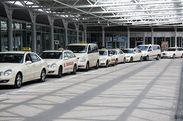FOR Communication 11/2017: The protest of the taxi drivers against Uber cost Warsaw residents at least 535 thousand zł

- The protest of taxi drivers against Uber on Monday, June 5, 2017, cost only Warsaw residents at least 535 thousand zł. This is the lower assessment, based data on the average speed of traffic from the Yanosik system. It includes the costs of commuting delays and work travels in the corporate sector (companies employing 10 or more employees). Therefore, the estimates do not include the public sector (administration, education, higher eucation, health services, etc.), micro-enterprises and the gray economy. At the same time, we are not counting the costs of non-work-related travel (for example, a person who has missed a medical examination or lectures in a private school).
- In Lodz, Poznan, and Wroclaw the taxi drivers' protest did not have a significant impact on average speed of traffic throughout these cities. So we skip these cities in cost estimation. Certainly there were also local delays that generated costs.
FOR has estimated the cost of taxi drivers' protest for working people in Warsaw on the base on average speed of traffic reported by the Yanosik system (commissioned by the City of Warsaw Traffic Research Council (WBR2015)1). We also used this year's traffic model update[2] and GUS publication about Warsaw3 .
Taxi drivers' protests took place in the morning on Monday, June 5, 2017, in Lodz, Poznan, Warsaw, and Wroclaw. However, based on data from the Yanosik system, only in Warsaw we can clearly see a significant reduction in the average speed across the city, as compared to May Mondays and Tuesday, June 6. That is why our assessment is about Warsaw (both methods of assessment show a decrease in the average speed of traffic by 11% between 9 and 10 a.m. in Warsaw, much more than in Wroclaw, which is the next, where it was only 4%).
Varsovians traveling to or at work lost on Monday, June 5, between 7:30-12:00, a total of 12.9 thousand hours more than they did in the same period on Tuesday, the day after. By converting it to an average salary, it means a loss of 535,000 zł.
How was the assessment made?
According to the Central Statistical Office (GUS), in Warsaw at the end of March there were 1 million employed in the corporate sector in companies employing 10 or more people (a fuller aggregate amount is unavailable). They earn on average 6,039 zlotys gross per month (the median is not available), calculated at the employer's cost per minute is 0.69 zlotys. We count commuting to work (home-work) and travel within the work (work-work).
In the case of commuting to work, on the base of WBR2015 we have assumed that 62% of them are commuting by private car or bus. Their hourly schedule is also available, with the peak arriving between 7 am and 8 am in the morning, even before a significant drop in speed in the city. The average journey time to work in Warsaw is 38 minutes; this amount is adjusted for walking trips and cycling, which are on average shorter than car and bus.
In the case of work travel, their number was difficult to estimate. We evaluated it on the basis of travel outside home location in WBR2015. The hourly work schedule and morning work-work travel time were already available in the study. Here it is important to note that in the case of freight (e.g., delivery trucks), travel delays in the workplace can be far more costly than the employee's pay.
Why is our assessment gives the lower limit of the actual cost of taxi drivers' protest?
Our estimate is the lower value of the losses caused by the taxi drivers protest as it is decreased by the following factors:
- We completely skip the costs of non-work-related travelers, After all, having missed a medical examination or being late for a private school lecture is also a cost.
- We do not include Lodz, Poznan and Wroclaw. Although the protests did not significantly reduce average speed throughout the city, it certainly has also hampered commuting to work and within work.
- The CSO data on the employed in Warsaw do not include those working in public administration, micro-enterprises and the grey sector.
- The protest disproportionately hit people traveling to work by cars in the later hours of the day. It can be assumed that the average earnings among them are higher than in the whole working population.
- Counting the cost of a delay in commuting as part of an average employee's pay can significantly underestimate the actual cost.
On the other hand, the taxi drivers' protest was announced earlier, so on Monday, June 5, fewer Warsaw citizens than usual could choose to travel by car and bus to work (for example, they could choose tram, metro or work from home). However, such optimization by the Warsaw residents also entailed costs.
Summary
It is natural that any innovation threatening well-established business models, in this case, licensed cabs, provokes protests. We should, however, analyze them primarily from the perspective of consumers who "vote with their wallets" for the availability of new services in the economics of sharing. Uber is competing with traditional taxis not only in price but also by some new facilities such as (1) automation of payments through the application, (2) ability to control the length of a passenger's journey through an application, (3) decentralization of quality control of services due to passenger’s rating of each trip, (4) automatic demand-based pricing, which increases the number of Uber drivers during peak hours, while maintaining the constant availability of customer service. It is worth noting that even if traditional taxis operate via applications, they will not be able to implement services (3) and (4).
See also Polish version.
1 http://transport.um.warszawa.pl/wbr2015
2 http://transport.um.warszawa.pl/warszawskie-badanie-waru-2015/model-waru-aktualizacja-20162017
3 http://warszawa.stat.gov.pl/download/gfx/warszawa/en/defaultaktualnosci/806/1/9/1/przeglad_04_2015.pdf
You are welcome to contact our expert:
Rafał Trzeciakowski, Economist at FOR
[email protected]
Files to download

